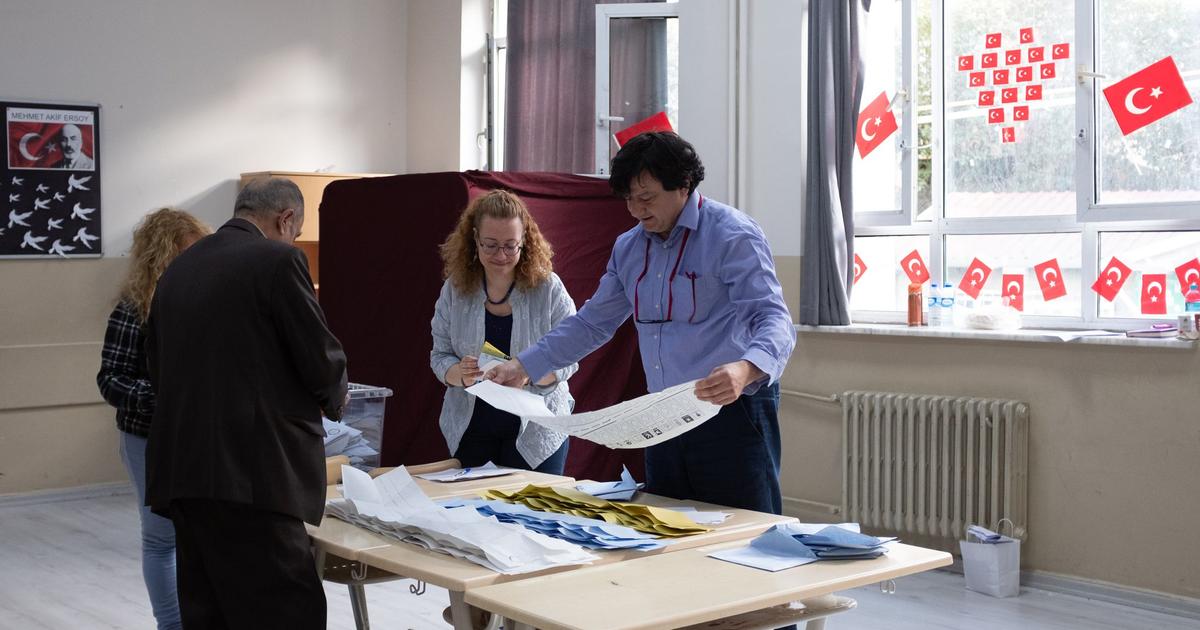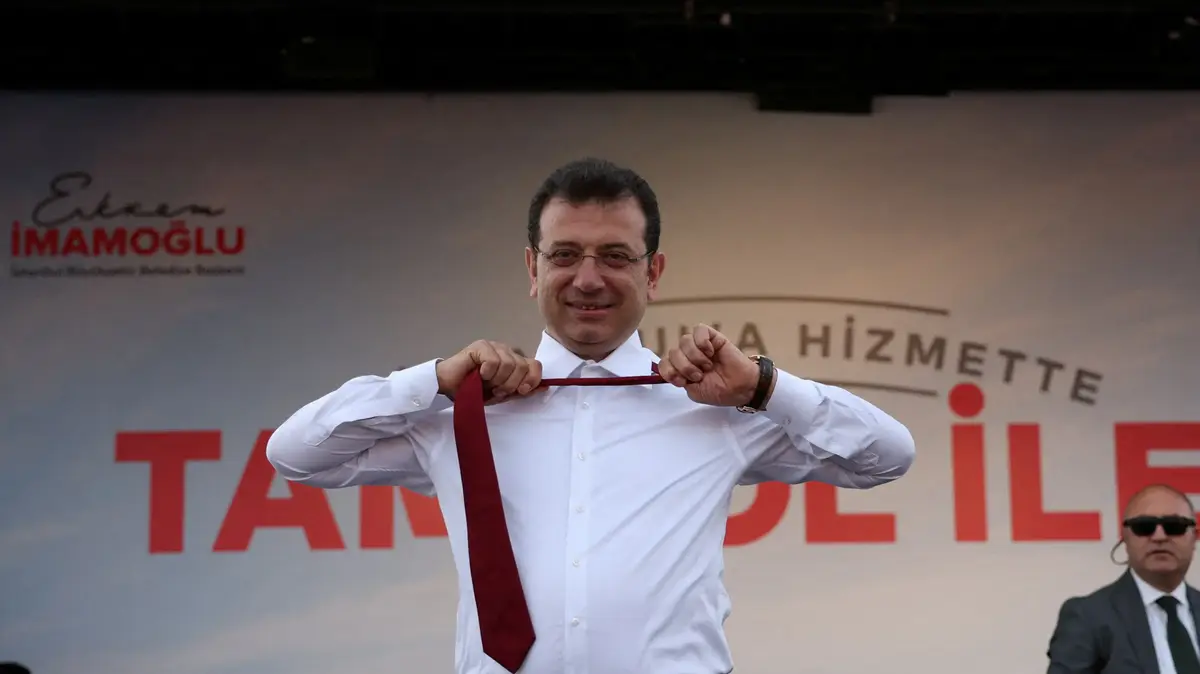ISTANBUL (AP) — President Recep Tayyip Erdogan overcame the biggest political challenge of his career on Sunday, securing victory in a presidential runoff that gave five more years to a mercurial leader who has irritated his Western allies while tightening his grip on the Turkish state.
His victory means Erdogan could remain in power for at least a quarter of a century, deepening his conservative imprint on Turkish society while pursuing his vision of a country with growing economic and geopolitical power.
Ballots for the second round of the presidential election at a polling station in Istanbul, Sunday, May 28, 2023. (Sergey Ponomarev/The New York Times)
It will establish itself as the driving force of a U.S. ally in NATO, a position it has leveraged to become a key broker in the Ukraine war and to enhance Turkey's status as a Muslim power with 85 million people and fundamental ties on every continent.
Turkey's Supreme Electoral Council declared Erdogan the winner late on Sunday.
He won 52.1% of the vote; opposition candidate Kemal Kilicdaroglu won 47.9% with almost all votes counted, according to the council.
Erdogan's supporters shrugged off Turkey's challenges, including a looming economic crisis, and praised him for developing the country and supporting conservative Islamic values.
In many Turkish cities, on Sunday night, they honked car horns, cheered and gathered in public squares to see the results and wait for his victory speech.
Thousands of people gathered outside Ankara's presidential palace, waving red and white Turkish flags.
"It's not just us who won, Turkey has won," Erdogan said to applause.
"It is our nation that has won with all its elements. It's our democracy."
Kilicdaroglu told supporters that he did not contest the vote count but that the overall election had been unfair.
In the run-up to the vote, Erdogan used state resources to tip the scales in his favor.
Supporters of President Recep Tayyip Erdogan celebrate his re-election in Istanbul on Sunday, May 28, 2023. (Sergey Ponomarev/The New York Times)
During his 20 years as the country's most prominent politician — as prime minister since 2003 and as president since 2014 — Erdogan has marginalized the country's traditional political and military elites and expanded Islam's role in public life.
Along the way, he has used crises to expand his power, centering important decisions on domestic, foreign and economic policy within the walls of his sprawling presidential palace.
His political opponents fear that five more years in power will allow him to consolidate it further.
Erdogan has given little indication of his intention to change course, both in domestic affairs and foreign policy.
Erdogan's unpredictability and frequent tirades against the West made officials in some Western capitals wonder which side he was on in the Ukraine war and, privately, wish he lost.
The Turkish leader condemned Russia's invasion of Ukraine last year but refused to join Western sanctions to isolate President Vladimir Putin and instead increased Turkish trade with Moscow.
He calls Putin "my friend" and has hampered NATO expansion efforts by delaying Finland's admission and even refusing to admit Sweden.
During his campaign, Erdogan indicated that he was comfortable with his stance on Ukraine.
He described Turkey's mediation at times between the warring parties to the conflict as "no ordinary action."
And he said he was not "working only to receive a 'good done' from the West," making clear that the wishes of his allies will not take precedence over his pursuit of Turkey's interests.
Erdogan knows that "the world has entered a phase where Western dominance is no longer a given," said Galip Dalay, a Turkey analyst at Chatham House, a London-based research group.
This view has led regional powers like Turkey to benefit from ties with the West even as it faces American rivals like Russia and China.
The idea is that "it is in Turkey's interest to participate in a geopolitical balance between the two," Dalay said.
Critics accuse Erdogan of pushing Turkey toward a one-man government.
Election observers claimed that while this month's vote was largely free, Erdogan used state resources and influence over the media to gain advantage, making the competition unfair.
Still, his opponents came closer than ever to unseating him, and many hope he will try to stop them from doing so again.
"Winning this election will give him maximum self-confidence, and I think from now on he will be considered unbeatable," said Gulfem Saydan Sanver, a political consultant who has advised members of the opposition.
"I think he will be tougher on the opposition."
Erdogan's victory was not easy.
In the first round of the elections, on 14 May, he faced a new coalition determined to unseat him by supporting a single candidate, Kilicdaroglu.
Most polls suggested that the president's popularity had been dented by a painful cost-of-living crisis that had strained Turkish families' budgets and he might even lose.
Erdogan's government also faced criticism for failing to react quickly after strong earthquakes in February killed more than 50,000 people in southern Turkey.
But in the end, the catastrophe did not affect the elections much.
Erdogan campaigned fiercely, meeting with earthquake victims, launching billion-dollar public spending to insulate voters from double-digit inflation and dismissing Kilicdaroglu as incapable of herding sheep, let alone leading the nation.
In fiery speeches, Erdogan seduced his supporters with songs and poetry and branded his opponents soft on terrorism.
Although he fell short of the majority needed to win in the first round, Erdogan took the lead with 49.5 percent of the vote to Kilicdaroglu's 44.9 percent, sending them into a runoff.
Over the years, Erdogan has merged with the image of the state, and is likely to continue to leverage Turkey's position among the West, Russia and other countries to increase his geopolitical influence.
Its relations with Washington remain thorny.
The United States withdrew Turkey from a program to receive F-35 fighters in 2019 after Turkey purchased an air defense system from Russia.
And during the long war in neighboring Syria, Erdogan criticized the United States for working with a Syrian Kurdish militia that Turkey says is an extension of a Kurdish militant group that has fought the Turkish government for decades to demand autonomy.
Erdogan's interior minister, Suleyman Soylu, accused the United States of an "attempted political coup" to unseat Erdogan during the campaign.
As proof, Soylu cited comments from President Joe Biden's own campaign, in which he criticized Erdogan as an "autocrat" and said the United States should support the Turkish opposition.
Diplomats acknowledge that Erdogan's ties with both Russia and Ukraine allowed him to mediate an agreement on the export of Ukrainian grain across the Black Sea, as well as the exchange of prisoners between the warring parties.
Recently, Erdogan has worked to mend relations with former regional foes, such as Israel, Egypt and the United Arab Emirates, in order to cool tensions and stimulate trade.
Following Turkey's conciliatory measures, Saudi Arabia deposited $5 billion in Turkey's central bank in March, helping to shore up its depleted foreign exchange reserves.
The Turkish leader has said he may meet Syrian President Bashar Assad after years of support for anti-Assad rebels.
The goal: to speed up the return of some of the millions of Syrian refugees in Turkey, a key demand of Turkish voters.
Erdogan, the son of a ferry captain who grew up in a tough Istanbul neighborhood and dreamed of playing professional football, retains the deep devotion of many Turks, who credit him with the country's development.
The rapid economic growth of the 2000s lifted millions of Turks out of poverty and transformed Turkish cities with new highways, airports and railway lines.
Erdogan also expanded Islam's space in public life.
Turkey is a predominantly Muslim society with a secular state, and for decades veiled women could not access universities or public jobs.
Erdogan relaxed those rules, and conservative women vote for him in large numbers.
He also has a habit of making smokers promise in writing that he finds they will quit.
In March, his office displayed hundreds of packs of cigarettes signed by the people Erdogan had taken them from, including his own brother and a former Bulgarian foreign minister.
It has also expanded religious education and transformed Hagia Sophia, Turkey's most famous historical landmark, from museum to mosque.
Musa Aslantas, a bakery owner, listed what he considered Erdogan's most recent achievements:
a discovery of natural gas in the Black Sea, Turkey's first electric car and a nuclear power plant being built by Russia.
"Our country is stronger because of Erdogan," said Aslantas, 28.
"He can stand up to foreign leaders. It makes us feel safe and powerful. They can't play with us like they used to."
Over the past decade, Erdogan has skillfully used crises to expand his authority.
In 2013 he responded to street protests against his government by restricting freedom of expression and assembly and jailing organizers.
After surviving a coup attempt in 2016, he purged the civil service and judiciary, creating vacancies for his loyalists.
The following year, Erdogan pushed through a referendum that shifted much of state power from parliament to the president, i.e. to him.
Over time, it has expanded its influence over the media.
Public broadcasting gives it widespread positive coverage, and critical private media outlets have been shut down or fined, prompting others to self-censor.
Erdogan's critics fear he will find new ways to weaken democracy from within.
"The judiciary is controlled by the state, the parliament is controlled by the state and the executive is controlled by Erdogan," said Ilhan Uzgel, a former professor of international relations at Ankara University who was fired by presidential decree.
"That means there is no separation of powers, which is the ABC of a democratic society."
Challenges
Erdogan's most immediate challenge may be the economy.
His insistence on lowering interest rates has exacerbated inflation, which peaked at more than 80 percent a year last year, economists say, and costly measures he took before the election added to the state's bills and depleted the central bank's foreign exchange reserves.
Without a quick turnaround, Turkey could soon face a currency crisis or recession.
Economic woes could lead more voters to seek change in the future, assuming Erdogan's foes can overcome their disappointment and mount another challenge.
"Erdogan has a clear vision of what he wants for the country, and he has had it since he was very young," said Selim Koru, an analyst at Turkey's Economic Policy Research Foundation.
"What people like about him is that he hasn't made compromises."
c.2023 The New York Times Company









